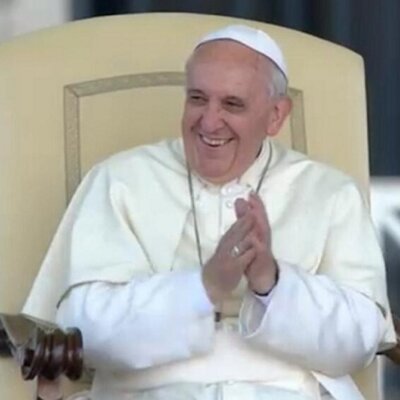A couple of days ago, Pope Francis addressed the "Colloquium on the Complementarity of Man and Woman," underway through November 19th. Our thanks to zenit.org for their timely English language translation.
Dear sisters and brothers,
I warmly greet you. I thank Cardinal Muller for his words with which he introduced our meeting. I would like to begin by sharing with you a reflection on the title of your colloquium. You must admit that "complementarity" does not roll lightly off the tongue! Yet it is a word into which many meanings are compressed. It refers to situations where one of two things adds to, completes, or fulfills a lack in the other. But complementarity is much more than that. Yet complementarity is more than this. Christians find its deepest meaning in the first Letter to the Corinthians where Saint Paul tells us that the Spirit has endowed each of us with different gifts so that-just as the human body's members work together for the good of the whole-everyone's gifts can work together for the benefit of each. (cf. 1 Cor. 12). To reflect upon "complementarity" is nothing less than to ponder the dynamic harmonies at the heart of all Creation. This is a big word, harmony. All complementarities were made by our Creator, so the Author of harmony achieves this harmony.
It is fitting that you have gathered here in this international colloquium to explore the complementarity of man and woman. This complementarity is a root of marriage and family. For the family grounded in marriage is the first school where we learn to appreciate our own and others' gifts, and where we begin to acquire the arts of cooperative living. For most of us, the family provides the principal place where we can aspire to greatness as we strive to realize our full capacity for virtue and charity. At the same time, as we know, families give rise to tensions: between egoism and altruism, reason and passion, immediate desires and long-range goals. But families also provide frameworks for resolving such tensions. This is important. When we speak of complementarity between man and woman in this context, let us not confuse that term with the simplistic idea that all the roles and relations of the two sexes are fixed in a single, static pattern. Complementarity will take many forms as each man and woman brings his or her distinctive contributions to their marriage and to the formation of their children -- his or her personal richness, personal charisma. Complementarity becomes a great wealth. It is not just a good thing but it is also beautiful.
We know that today marriage and the family are in crisis. We now live in a culture of the temporary, in which more and more people are simply giving up on marriage as a public commitment. This revolution in manners and morals has often flown the flag of freedom, but in fact it has brought spiritual and material devastation to countless human beings, especially the poorest and most vulnerable.
Evidence is mounting that the decline of the marriage culture is associated with increased poverty and a host of other social ills, disproportionately affecting women, children and the elderly. It is always they who suffer the most in this crisis.
The crisis in the family has produced an ecological crisis, for social environments, like natural environments, need protection. And although the human race has come to understand the need to address conditions that menace our natural environments, we have been slower to recognize that our fragile social environments are under threat as well, slower in our culture, and also in our Catholic Church. It is therefore essential that we foster a new human ecology.
It is necessary first to promote the fundamental pillars that govern a nation: its non-material goods. The family is the foundation of co-existence and a remedy against social fragmentation. Children have a right to grow up in a family with a father and a mother capable of creating a suitable environment for the child's development and emotional maturity. That is why I stressed in the Apostolic Exhortation Evangelii Gaudium that the contribution of marriage to society is "indispensable"; that it "transcends the feelings and momentary needs of the couple." (n. 66) And that is why I am grateful to you for your Colloquium's emphasis on the benefits that marriage can provide to children, the spouses themselves, and to society.
In these days, as you embark on a reflection on the beauty of complementarity between man and woman in marriage, I urge you to lift up yet another truth about marriage: that permanent commitment to solidarity, fidelity and fruitful love responds to the deepest longings of the human heart. I urge you to bear in mind especially the young people, who represent our future. Commit yourselves, so that our youth do not give themselves over to the poisonous environment of the temporary, but rather be revolutionaries with the courage to seek true and lasting love, going against the common pattern.
Do not fall into the trap of being swayed by political notion. Family is an anthropological fact - a socially and culturally related fact. We cannot qualify it based on ideological notions or concepts important only at one time in history. We can't think of conservative or progressive notions. Family is a family. It can't be qualified by ideological notions. Family is per se. It is a strength per se.
I pray that your colloquium will be an inspiration to all who seek to support and strengthen the union of man and woman in marriage as a unique, natural, fundamental and beautiful good for persons, communities, and whole societies.




























